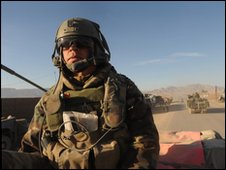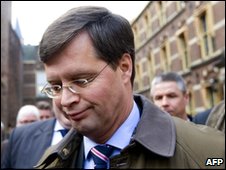 Dutch forces have been in Uruzgan since 2006 Dutch forces have been in Uruzgan since 2006 |
The Dutch government has collapsed over disagreements within the governing coalition on extending troop deployments in Afghanistan.
After marathon talks, Christian Democratic Prime Minister Jan Peter Balkenende announced that the Labour Party was quitting the government.
He offered his government’s resignation to Queen Beatrix in a telephone call.
The premier had been considering a Nato request for Dutch forces to stay in Afghanistan beyond 2010.
But Labour, the second-largest coalition party, has opposed the move.
Just under 2,000 Dutch service personnel have been serving in the southern Afghan province of Uruzgan since 2006, with 21 killed.
Their deployment has already been extended once.
The troops should have returned home in 2008, but they stayed on because no other Nato nation offered replacements.
The commitment is now due to end in August 2010.
The Dutch parliament voted in October 2009 that it must definitely stop by then, although the government has yet to endorse that vote.
Mr Balkenende’s centre-right Christian Democrats wanted to agree to Nato’s request to extend the Dutch presence in Afghanistan.
But this was bitterly opposed by the Dutch Labour Party.
The finance minister and leader of the Labour Party, Wouter Bos, demanded an immediate ruling from Mr Balkenende.
When they failed to reach a compromise, Labour said it was pulling out of the coalition.
Nato priority
Mr Balkenende said he would offer the cabinet’s resignation to the Dutch Queen Beatrix later on Saturday following the collapse of the government.
| ANALYSIS
By Geraldine Coughlan The Defence Ministry says the future of the Dutch mission in Afghanistan depends on the new government. But a new government may prove difficult to establish. Opinion polls suggest that a handful of parties may be needed to form a coalition. They also suggest the right-wing opposition Freedom Party, which has called for an end to the Afghan mission, could be the big winner in the general election. |
It was announced after a 16-hour cabinet meeting which ran into the early hours of Saturday morning.
The prime minister said there was no common ground between the parties.
“Where there is no trust, it is difficult to work together. There is no good path to allow this cabinet to go further,” he said.
The launch in 2001 of Nato’s International Security Assistance Force (Isaf) for Afghanistan was the organisation’s first and largest ground operation outside Europe.
Secretary-General Anders Fogh Rasmussen said six months ago when he began his job that his priority was the war in Afghanistan.
As of October 2009, Isaf had more than 71,000 personnel from 42 different countries including the US, Canada, European countries, Australia, Jordan and New Zealand.
 Mr Balkenende had been considering the Nato request Mr Balkenende had been considering the Nato request |
The US provides the bulk of foreign forces in Afghanistan, and President Barack Obama has announced an extra 30,000 American troops for Afghanistan.
The Pentagon has said the next 18 months could prove crucial for the international mission in Afghanistan, after more than eight years of efforts to stabilise the country.
Afghanistan remains a deadly place for foreign forces.
Suicide attacks on Afghan civilians and roadside bomb strikes on international troops are common, with the Taliban strongly resurgent in many areas of the country.
Page last updated at 14:37 GMT, Saturday, 20 February 2010
Source: BBC NEWS